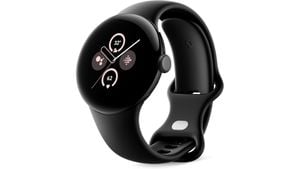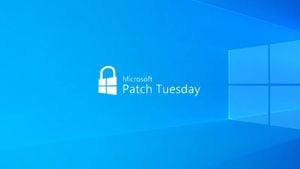Just weeks after McDonald's faced scrutiny over E. coli outbreaks linked to onions served on their Quarter Pounder burgers, concerns are once again rising as health officials scramble to track the illnesses associated with the fast-food giant. With at least 104 reported illnesses, four patients suffering from life-threatening kidney disease, and one suspected death, the aftermath has left customers wary of returning to the iconic restaurant.
McDonald’s has been proactive, removing the Quarter Pounder from their menu amid the crisis and responding to the allegations of contaminated food. The outbreak traces back to suspicious slivered onions used on the burgers, with the CDC investigating the links between these onions and the bacteria found. E. coli is infamous for causing gastrointestinal issues such as diarrhea, abdominal pain, and, more severely, kidney damage, especially among vulnerable populations.
Health authorities are wary, as the outbreak has led to multiple hospitalizations and left many across the nation questioning the safety of their favorite fast-food meals. According to the Centers for Disease Control and Prevention (CDC), the agency is still monitoring the situation closely; their investigation remains open. They have noted the initial concerns involving the onions were substantiated with the identification of the pathogen within the food.
The chain did tender its apologies to customers, recognizing the trust lost amid the health scare, but their fortunes took a hit nonetheless. After the outbreak, McDonald's stock took a nosedive and the company is now reportedly spending over $100 million to win back the trust of its patrons. This includes $35 million geared toward marketing campaigns and another $65 million allocated to aid stores impacted by the fallout of this incident. New promotions like $1 chicken nuggets are intended to entice consumers back to the restaurant.
Melanie Firestone, an assistant professor and epidemiologist at the University of Minnesota, explains the role of innovation and technology. She details how whole-genome sequencing has revolutionized the tracking and identification of foodborne illnesses. This process works like creating DNA fingerprints for pathogens, allowing health officials to link cases of illness together more efficiently than, say, just five years ago. Firestone notes, “We have a lot of tools for detecting pathogens now,” emphasizing the importance of tracing back outbreaks to the source quickly.
The current food safety protocols and investigations initiated by federal agencies, including the FDA, are part of efforts to suffocate future outbreaks. They have reported no persistent safety concerns associated with McDonald's restaurants since the onions were recalled. “At this time, based on preliminary investigations, there does not appear to be continued food safety concerns related to this outbreak,” the FDA reassured the public.
While the corporate response has been swift and they have publicly assured consumers about safety, it remains to be seen if the public is fully convinced. Many consumers are grappling with the emotional gravity of trusting food manufacturers and resources once again. Bryan Quoc Le, another food safety researcher, highlights the implicit trust between consumers and food suppliers. According to him, “When there is the possibility of bodily harm from food, consumers quickly lose trust.”
Yet, some experts, including Le, advocate for the safety of McDonald's meals based on the heightened scrutiny the chain now faces from governing bodies. “Given the heightened monitoring and the strict supplier guidelines set up post-incident, fast-food giants like McDonald’s are more likely to adopt stricter safety measures quickly,” he said. Following the outbreak, Le maintains there’s reason to believe McDonald’s will act with diligence, especially now as they are under rigorous observation.
Brian Labus, infectious disease epidemiologist and assistant professor, took this sentiment a step beyond, likening McDonald's situation to getting pulled over by the police for speeding. “After getting your ticket, you are probably the safest driver on the road,” he remarked, comparing the chain’s new-found focus on safety to heightened awareness after an incident. Labus stresses, “McDonald’s didn’t become the biggest fast food chain on earth by making people sick,” emphasizing their continuous efforts to enforce internal food safety measures and inspections.
McDonald's has committed to never compromising on food safety and has openly thanked public health authorities for their collaboration, which allowed for swift action to protect consumers. The chain stated: “Food safety is something we will never compromise on.” Given the magnitude of McDonald's market presence and the vast resources available to optimize their supply chain's safety protocols, one can hope for enhanced consumer protection moving forward.
Among all the uncertainty, it’s important to note food safety experts aren't entirely downcast. They believe the heightened awareness and public challenge will lead to improved guidelines and practices across the industry, not only at McDonald's but throughout the entire fast-food sector. The observed trend is one of gradual improvement over time as both companies and regulators learn through these trials.
Before heading to your local McDonald’s, it might spark some curiosity if the fears are justified or if customers should give the fast food establishment another chance. With oversight from federal organizations and commitment from McDonald’s toward improved safety, should consumers feel more at ease? Where foodborne illnesses occur, even swift corporate responses won't always quell public fear. Still, industry experts encourage patrons to analyze what the current regulatory responses entail compared to their past experiences. Remaining vigilant about food safety measures might help calm those worried about their next fast-food meal.
While many are likely to remain cautious, knowing the analysis and improvements undertaken post-outbreak might provide some assurance. Those who decide to venture back to McDonald's may find it to be one of the safest times to eat there, as protocols are likely being reinforced rigorously post-crisis.



